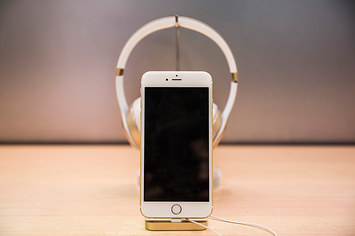Carolyn Kaster / AP
The FBI no longer needs Apple’s help to access an iPhone used by an alleged drug dealer in Brooklyn, ending yet another legal standoff between the FBI and Apple over locked devices.
“Yesterday evening, an individual provided the passcode to the iPhone at issue in this case,” U.S. Attorney Robert Capers wrote in a letter to the court of the Eastern District of New York Friday. “Late last night, the government used that passcode by hand and gained access to the iPhone.”
Officials were trying to gain access to phone of an accused methamphetamine distributor. But the device was locked, prompting the government to seek assistance from Apple. The company objected to the government’s demands, however, arguing that the Justice Department was misinterpreting the law, and that the it failed to show why investigators could not access the device themselves, without forcing Apple’s to do so.
The suspect, Jun Feng, had already pled guilty to the charge, but investigators believe the phone may hold potential evidence into a drug conspiracy. Feng had told authorities he did not remember the passcode to the phone, according to court documents.
But on Thursday, it was Feng himself who provided the passcode to investigators, according to The Wall Street Journal, allowing the government to successfully unlock the phone.
The last minute breakthrough, announced Friday night, on the deadline the government had to respond to Apple’s challenge, recalls the sudden and unexpected turn of events in San Bernardino, where the Justice Department called off litigation there after an unidentified outside party showed the FBI how to access the device.
The two cases have been at the center of the debate over encryption and whether private companies such as Apple can be legally compelled to provide access to the secure data of their customers.
But as both sides have headed to what seemed to be a legal resolution in court, the Justice Department on two occasions has withdrawn it’s request for a court order, after finding a last minute solution.
Apple has argued that the true goal of the Justice Department is to set a legal precedent, in which the government can force tech companies to alter or weaken their security products.
On Friday, a spokeswoman for the department disputed that claim.
“As we have said previously, these cases have never been about setting a court precedent; they are about law enforcement’s ability and need to access evidence on devices pursuant to lawful court orders and search warrants,” Emily Pierce, spokeswoman for the Department of Justice said in a statement to BuzzFeed News.
“Because we now have access to the data we sought, we notified the court of this recent development and have withdrawn our request for assistance.”
The Justice Department did not identify the individual who provided the passcode.
In Apple’s court filing last week, it argued that the government failed to prove why it requires the company’s help to access the device. “The government has made no showing that it has exhausted alternative means for extracting data from the iPhone,” Apple’s lawyers wrote.
“Likewise, the government has offered no evidence that it has attempted to prompt Feng’s memory by showing him a similar phone or having him try to recall the passcode (likely just a 4-digit PIN) by remembering passcodes he commonly uses on other devices.”
In New York, as in San Bernardino, an imminent courtroom battle was averted. But for Apple and its allies, the government’s announcement can be seen as a modest victory.
In February, in the same New York court involving the same iPhone, Federal Magistrate Judge James Orenstein ruled that the government lacks the lawful authority to compel Apple to access a suspect’s encrypted information against the company’s will. Now that the government has abandoned its litigation with Apple, Orenstein’s decision in the company’s favor remains unchallenged.
While his ruling doesn’t carry much precedent in other jurisdictions across the country, his is the first that exists on the issue of court orders and encrypted devices.
- Beyoncé surprised everyone (again) by dropping her new album "Lemonade." 👑 🐝
- Need plans? Screenings of the 1984 Prince movie "Purple Rain" start this weekend in select AMC theaters in the U.S. 💜
- Methodist clergy officiated a same-sex couple's wedding in North Carolina in defiance of church doctrine.







